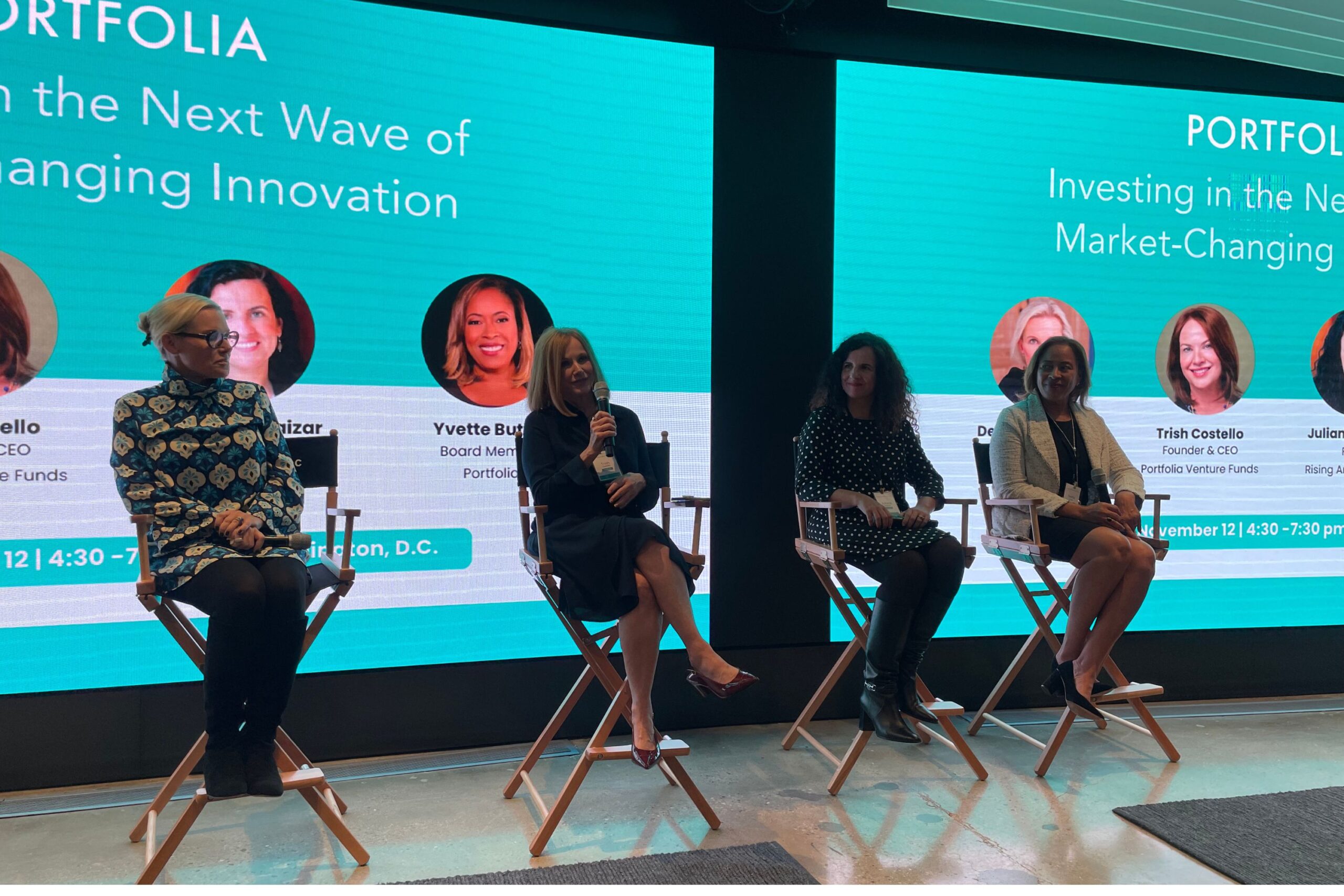In the face of ongoing legal and political threats toward programs addressing inequality, a global VC firm opened a new fund to support underresourced entrepreneurs — and chose DC as the place to do so.
Portfolia, a San Mateo, California-headquartered firm, on Tuesday launched its 14th fund that specifically caters to founders investors typically overlook, including women, people of color and LGBTQ+ entrepreneurs. Called Rising America III, it’s the third iteration of the fund and the firm’s most successful one, said Trish Costello, Portfolia’s founder and CEO.
“When you back companies focused on these huge markets, led by diverse founders,” Costello told the crowd, “you get amazing numbers.”
Portfolia focuses on companies tackling women’s health, aging, sustainability and generally “changing the world,” she said. To date, the firm has invested $70 million across its funds.
The firm made the announcement at the DC location for JLABS, the life science incubator and accelerator arm of the pharmaceutical and biotech giant Johnson and Johnson. That space is located at the Children’s National Research and Innovation Campus in Northwest DC, formerly the Walter Reed Army Medical Center campus.
Portfolia’s team unveiled this fund in conjunction with its attending and speaking at the Milken Institute think tank’s Future of Health Summit, which focuses on the intersection of technological innovation and medical research.
Building off of a proven concept
At Portfolia, the goal is to funnel capital to underrepresented founders and sectors across the firm’s 14 funds. That effort needs to be reflected in the investors and partners themselves, said Juliana Garaizar, a partner of Rising America.
The venture firm is proactive in that, she said — Rising America is the first venture capital fund led by five Black and Hispanic women, to Garaizar’s knowledge.

“We created these funds to democratize access to venture capital, and the reason we did it is because we wanted to take matters into our own hands,” Garaizar said. “We didn’t want to wait on Silicon Valley to hire more diverse.”
She also attested to the success of the fund’s previous iterations. Canela, a Spanish language media company from New York City that received funding during a prior Rising America round, went from a $10 million valuation to a $400 million valuation thanks to Portfolia’s investment, per Garaizar.
Portfolia has more than 140 companies across its portfolio, with 60 of those being health-related. Two of those companies are now valued at more than a billion dollars, including the virtual health platform Maven Clinic and the diagnostics company Everly Health in New York and Austin, respectively.
Estate planning software company OneDigitalTrust in Tysons is also a part of the firm’s portfolio, along with the healthcare software company B.well Connected Health and the smart home automation firm Iotas, both based in nearby Baltimore.
Wealth gap persists for women and people of color
Founder and CEO Costello started Portfolia eight years ago, with a mission to put women at the center of funding innovations in women’s health.
“We are here to catalyze health, to make it work … to do it differently,” said Yvette Butler, a Portfolia board member and DC native. “Women want to be involved in their investments. Women want to be activated. Women want to invest in things that are going to have impact on their communities.”
Investment in women’s health startups has grown in recent years as more VC firms start paying attention. Startups in that industry collectively raised $1.14 billion in 2023 across 120 deals, according to Pitchbook, and investment tripled between 2018 and 2023.
Funds like Portfolia are only possible because more women have the means to accumulate wealth, Costello noted.
There are still persistent gender and racial inequities in investing. The gender salary gap is often talked about, Garaizar said, but the wealth gap isn’t discussed enough. There needs to be more spaces to teach women how to invest and provide spaces to learn and ask questions, she noted.
“What you do with the money is equally, if not more, important,” Garaizar said.
Costello founded Portfolia to approach venture capital differently, she said. She’s often seen investors not have as much of a say. But at her firm, limited partners and founders will meet to pitch and ask questions every month.
“You could put $20 million into a venture firm. You’ll never be at the table.” Costello said. “At Portfolia, we do it differently … It’s really more of a movement to get all of us involved and have our ability to be the gatekeepers at the table as well.”
Johnson & Johnson
